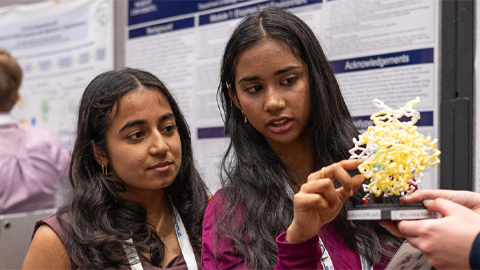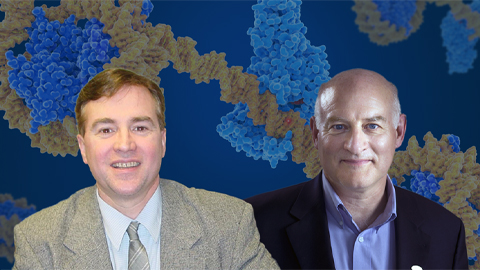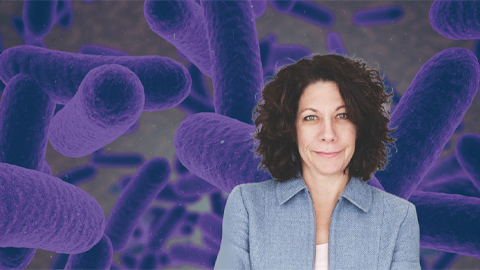JoAnn Trejo recognized for her support of underrepresented minorities
The American Society for Biochemistry and Molecular Biology named JoAnn Trejo at the University of California, San Diego, the winner of the Ruth Kirschstein Diversity in Science Award. The award recognizes outstanding scientists who show a strong commitment to mentoring and encouraging underrepresented individuals to enter the sciences.
 "I am truly honored to receive the Ruth Kirchstein Diversity in Science Award. Diversity is imperative for the advancement of science and we must cultivate talent with inclusion of individuals from across the social spectrum. Ruth Kirchstein was a champion for individuals underrepresented in science and receiving this award is a real inspiration. " — JOANN TREJO
"I am truly honored to receive the Ruth Kirchstein Diversity in Science Award. Diversity is imperative for the advancement of science and we must cultivate talent with inclusion of individuals from across the social spectrum. Ruth Kirchstein was a champion for individuals underrepresented in science and receiving this award is a real inspiration. " — JOANN TREJO Trejo was the youngest of five children in a family of migrant farm workers led by a single mother with little education. She credits her mother’s strong work ethic along with her teachers’ support for helping her become a leading educator and world-class researcher in the field of molecular pharmacology. “These principles served her well and have guided all aspects of her life,” said Susan S. Taylor, who nominated Trejo for the ASBMB award. “(She) has continued to be remarkable not only for her creative research that is pioneering new frontiers at the interface between lipids, proteins and membranes but also by her dedication to academics and to underrepresented students and fellows in particular.”
Trejo earned her bachelor’s degree in toxicology and biochemistry at the University of California, Davis. She then earned her Ph.D. in the lab of Joan Heller Brown at UCSD. When Trejo was challenged in those early years, Brown said, “she really showed her colors, responding in ways that truly proved her capabilities.” Trejo then completed a postdoc in the lab of Shaun Coughlin at the University of California, San Francisco, where she focused on vascular cell biology.
She took her first faculty position at the University of North Carolina, Chapel Hill, in 2000 and then moved to UCSD, where she was promoted to professor a few years ago.
Throughout her academic career, Trejo has been a champion for diversity. She has trained 25 students and fellows and 23 undergraduates, many of whom were women and from groups underrepresented in science. “Her own experiences have transformed her into a passionate advocate for (underrepresented minorities), and she has used this passion creatively to mentor at all levels and to build new programs and new awareness in her colleagues,” Taylor said.
Trejo is a member and served as the diversity coordinator of UCSD’s umbrella Biomedical Sciences Graduate Program and the Medical Scientist Training Program. In addition, she is active on many national advocacy committees, including the American Society for Cell Biology’s Women in Cell Biology and Minority Affairs committees, the Society for the Advancement of Chicanos and Native Americans in Science, and the Keystone Symposia Diversity Advisory Committee.
In 2013, Trejo became director of the Institutional Research and Academic Career Development Award, or IRACDA, Postdoctoral Training Program at UCSD. IRACDA is a unique National Institutes of Health-sponsored program designed to develop a diverse group of highly trained scientists to address the nation’s biomedical research needs, and this position represents a tremendous honor for Trejo and reflects her commitment to diversity in science. Trejo received the 2014 UCSD Chancellor’s Award for Excellence in Postdoctoral Scholar Mentoring.
Trejo’s research focuses on understanding the regulation of G protein-coupled receptor signaling, specifically the mechanisms responsible for regulating signaling by protease-activated receptor-1. PAR1 is a GPCR for the coagulant and anticoagulant proteases. Trejo has made numerous novel discoveries related to the regulation of GPCR signaling and has published more than 60 papers on this topic.
Trejo has led two Gordon Conferences; has received many honors, including the American Heart Association’s Established Investigator Award; and has given many keynote addresses.
Enjoy reading ASBMB Today?
Become a member to receive the print edition four times a year and the digital edition monthly.
Learn moreGet the latest from ASBMB Today
Enter your email address, and we’ll send you a weekly email with recent articles, interviews and more.
Latest in People
People highlights or most popular articles

ASBMB undergraduate education programs foster tomorrow’s scientific minds
Learn how the society empowers educators and the next generation of scientists through community as well as accreditation and professional development programs that support evidence-based teaching and inclusive pedagogy.

Honors for Gagna and Sundquist
Claude Gagna is being honored for the diagnostic tool he developed that uses AI to streamline diagnostics. Wesley Sundquist is being honored for his role in finding that HIV’s capsid was a target for treatment.

Gaze into the proteomics crystal ball
The 15th International Symposium on Proteomics in the Life Sciences symposium will be held August 17–21 in Cambridge, Massachusetts.

Bassler receives National Medal of Science
She was recognized for her research on the molecular mechanisms bacteria use for intercellular communication.

2025 ASBMB election results
Learn about the new president, secretary, Council members and committee members.

2025 PROLAB awardees announced
Seven early-career scientists receive grants to advance their research by working in North American labs.

